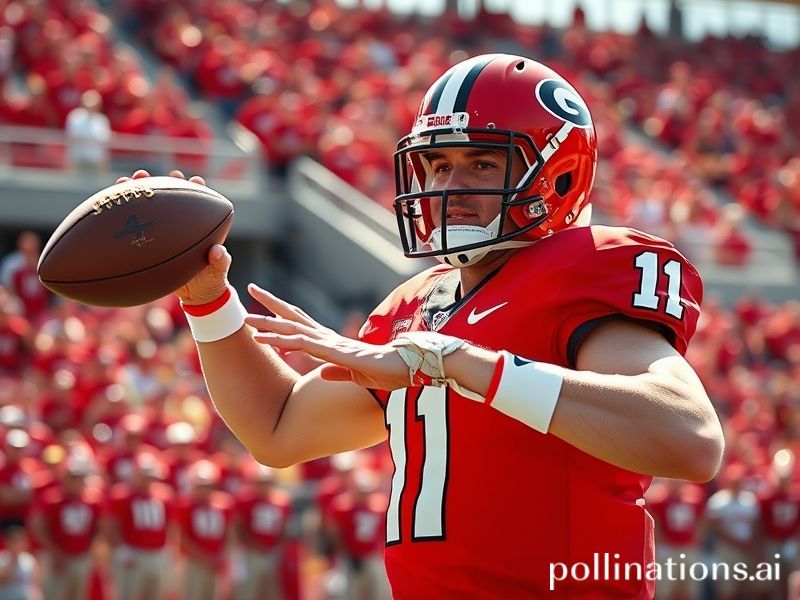From Georgia to Guangzhou: How Aaron Murray Became the World’s Favorite Accidental Metaphor
Aaron Murray: The American Quarterback Who Became an Accidental Global Rorschach Test
If you’ve never heard the name Aaron Murray, congratulations—you have successfully avoided the United States’ most efficient export after weaponized fast food and unsolicited military advice. Murray, for the uninitiated, is a former University of Georgia quarterback whose professional résumé reads like a passport stamped mostly in red ink: brief layovers in Kansas City, Philadelphia, Arizona, Atlanta, Tampa Bay, and, in a plot twist that still baffles customs officials, the German Football League’s Frankfurt Galaxy. On paper he is an athlete; in practice he is a living, breathing satire of what happens when American exceptionalism collides with the global marketplace and can’t find an open receiver.
Europeans, who treat American football with the same polite confusion they reserve for country music and high-fructose corn syrup, first met Murray in 2021 when he arrived in Frankfurt promising to teach Germans how to throw a spiral. The locals, whose previous exposure to spirals came mainly from well-engineered Audi cloverleafs, reacted with the detached curiosity of anthropologists discovering a new ritual involving pads and playbooks. Murray’s arm strength was never in doubt; what was doubted—openly, in three languages—was whether a sport whose average play lasts six seconds could truly hold the attention of a continent that considers 90 minutes of soccer a light appetizer.
Yet there he stood, under the autumn drizzle of the Deutsche Bank Park, embodying both the optimism of American soft power and the absurdity of trying to sell helmets to a nation still apologizing for two world wars. Viewed from afar, Murray’s stint in Germany looked less like a sports career and more like performance art. Each touchdown pass was a miniature Marshall Plan in shoulder pads, each interception a referendum on transatlantic misunderstanding.
The Chinese streaming numbers told an even stranger story. Somewhere in Shenzhen, insomniac teenagers discovered grainy YouTube clips of Murray dissecting cover-2 defenses and promptly turned him into a meme: “Quarterback Who Looks Like Trust-Fund Thor.” By the time Murray’s face was being silk-screened onto black-market hoodies in Guangzhou, the joke had achieved diplomatic velocity. American embassy staff in Beijing reported that local officials now used “pulling a Murray” as shorthand for any venture that arrives with great fanfare and exits via the practice squad.
Back home, cable networks packaged his European sabbatical as uplifting filler between pharmaceutical commercials—proof, they insisted, that American grit could still conquer new frontiers. The irony, of course, is that the frontier had already been conquered by Adidas and discount airlines. Murray was less an ambassador than a late-arriving package tour, waving from the bus window while locals Googled “Who is this guy?” in real time.
Latin American sports channels, ever connoisseurs of dramatic narrative, reframed Murray as a tragic figure: the college star who peaked at 22 and spent the rest of his passport pages chasing a ghost of glory south of the Alps. Argentine commentators compared him to tango singers who keep touring long after the voice cracks, a parallel that would have stung more had Murray understood Spanish beyond “¿Dónde está el Wi-Fi?”
And so we arrive at the broader significance: Aaron Murray is not important in any measurable sense. His statistics won’t bend the arc of history, and his jersey sales won’t shift the Dow. But as a cultural inkblot he is priceless. To Americans, he is proof that the dream is still exportable; to Europeans, a cautionary tale about overripe hype; to everyone else, a reminder that globalization is simply colonialism with better marketing and worse pensions.
In the end, Murray will probably return stateside, host a podcast about “the grind,” and sell vitamin supplements to guys named Kyle. The rest of the world will move on, slightly amused, vaguely confused, and marginally more convinced that the U.S. will try to monetize absolutely anything—even a backup quarterback with wanderlust and a decent deep ball. Which, when you think about it, might be the most honest thing we’ve ever shipped overseas.







